|
We are pleased to present our first flashglass anthology! Comprised of all flash works originally published online at rowanglassworks.org in 2015, this anthology is available for online viewing, digital download, and for purchase in print.
Thanks to all our contributors for allowing us to present their work this year!
0 Comments
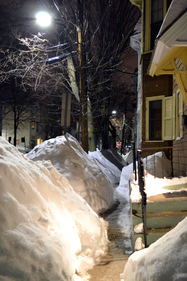 “People forget years and remember moments.” - Ann Beattie, “Snow” Of everything, I remember the last time I visited you at the toy store. It was a Friday, early February, the day it really started to snow in earnest; and since I wasn’t working Fridays then, I came downtown to keep you company. The city had already fled: traffic out of town at a standstill, high beams on, wipers going; Main Street as empty as a stage. The afternoon sprawled before us. One o’clock, two o’clock, three o’clock: customer-less hour after customer-less hour crept by, so we drifted through aisles of bouncy balls and jigsaw puzzles and deluxe backgammon sets, board games with names like Gassy Gus and Gooey Louie. You actually sell this shit? I said incredulously, game in hand, and you laughed and said, what’s more, people actually buy it. Meanwhile, the snow outside came down in curtains. It stacked on top of cars, buried curbs, drifted against the door, and it wasn’t until I stepped outside to feed the meter that I realized that every other store in sight had closed down and slipped away to the warmth of furnaces and fireplaces. I went back inside and said, look at this, and we stepped out as an ambulance slid by at ten miles an hour, lights flashing a silent symphony of reds and blues against the white canvas of the city. It rounded a corner and vanished; the snow twisted in the wind like someone shaking out a sheet and covered the tracks with ease. And because it felt like nothing was quite real that day, you locked the store and we wandered off into the padded afternoon. Street after street: bars, thrift stores, movie theaters, all boarded up, desolate. There was a kind of freedom in it. Snow nestled in your hair; silence nestled in every alley. There in the empty streets, I felt closer to you than I had in a long time. Maybe you remember it differently. Maybe you remember only the cold, how the city had seemed -- for weeks -- to be electrified: doorknobs, handrails, water fountains, all treacherous. Maybe the tips of your ears had already begun to sting, or your coat had a hole or had been forgotten behind in the store. Maybe the whole time you were searching for another face, a set of footprints in the snow, a cough or a car horn, because there was something eerie about the lack of sound: a city on mute, where even the ambulances didn’t turn on their sirens. Maybe there was a weight. Maybe, when you recall that aimless afternoon spent among piles of action figures and stuffed animals, you remember not ducking behind towering displays of yo-yos and shooting toy arrows at each other, but the spaces in our conversation: the cramped, uneasy silence between us. I’m worried we’re going stale, you said to me not long after. Past our expiration date. Maybe we’ve come as far as we can. We’re not the people we used to be. But I barely heard you, because I kept trying to picture us as bread gone hard, or milk gone sour, and instead I just saw seeds struggling up through frost-bitten earth. Look back, I wanted to say. We remember beginnings, not endings. We remember the quiet beauty of the first kiss, not the banality of the last. We forget the dead air, the long drives with nothing to talk about, the arguments about the future, and we hold on to trinkets of memory: blues dancing at one in the morning, our bodies in slow motion; washing you in the shower, water in streams down your back, my fingers drawing lines from freckle to freckle; wandering the empty, muffled streets of our city, snow whipping around, you burrowed into my arm for warmth. Look back. But maybe you don’t remember that day at all. Maybe all you remember is a day when it started to snow and didn’t stop for a week. Maybe everything else about that day has gone, melted away, and all that remains when you close your eyes is a world swallowed in snow, lost beneath a billowing, unending blanket of white.  Will Preston was born in Virginia and has since lived in Oregon, England, and the Netherlands. He has written extensively on film, travel, music, and history, and is currently pursuing an MFA in Creative Writing at the University of British Columbia. This is his first publication. 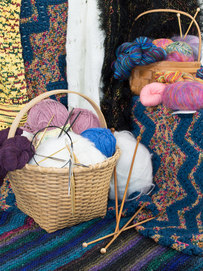 I was a one-woman witness to your parade. The yarn shop was empty when you arrived with eight kids. You were the first customer, just past noon. You nodded hello but turned to the six girls and two boys, the oldest maybe 12, the youngest maybe 4. With a voice that braided patience and prompting with promise, you stated rules. Older children take the hand of a younger. Do not touch. Follow me. Such obedient children. Long dresses, the boys in practical cloth pants and button-up shirts. Braids and bowl cuts. Were you Amish, or Mennonite, or Mormon? I did not know and could not ask. You walked past mohair puffing out of a basket. Sweater wool cubbied by color. Silk looped and twisted like pastry to pick up off a glass shelf. My job was to display yarn so you could touch it. Touch is creativity, an idea, and the beginning of the self and possession. I did not think the children would follow your rules. I was born with the bloodlines of touch. My parents owned a greenhouse. Fingers in dirt and moss, palms on thorns and blossoms, arms pressing terracotta. For so long I thought all parents owned stores and all kids could within them do as they pleased. The children followed you down every aisle, touching nothing, saying nothing, a stunning success of proper behavior. But then the real test. The store’s mascot, a grey Maine coon cat, asleep on the couch. Her name was Blanche, like one of the Golden Girls. That cat was meant to be petted. You were supposed to choose a ball of baby alpaca yarn, infant blue, and sit with Blanche to browse patterns from the three binders. You were supposed to slide your fingers through Blanche’s long striped fur, her ruffly white chest, even brush the tufts on her ears and decide to buy a little extra yarn, just in case, plus this one extra pattern, and why not let all the girls pick out cotton for crafts, and Blanche would chirp her meow and stretch out her ridiculous fox tail, which you, all of you, could pet. None of this happened. No one petted the cat, for the first time in the history of the yarn store. At the door, you praised the children for listening. You turned to me and said thank you, it’s a lovely store, perhaps we will be back. Perhaps you never left, because I remember you so clearly now. I remember how your children grew up to listen and to respect, like those rules were longer bones in their hands, faster springs in their steps, tighter weaves in their worlds. I hope they also grew up to touch something decadent, something useless, and something luxurious, even though I admit there are days now when I wish you would stop me at the door, lay down the rules, and say, “follow me.”
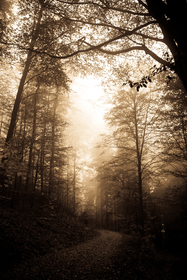 I am a hunter, she says. And fires wild into the fleeing geese. The wide blast of the gun breaks into the spring of her shoulder. And she feels it in the bones of her chest. The spreading pellets in the sky like fistfuls of rain. Later, he drives and she stares out the window at the running fields of twisted grass and the thin Ash woods of upstate. A natural hunting blind. He spots dried mud under his fingernails while making a slow turn, from one narrow road to another. He has the urge, like the urge to drink, to pull over there, in the grass, and pick the mud out with his slim folding knife, which he takes always into the wild, the grasses, but has never used. He resists. Did you have fun? he says. Wish I'd hit something. That isn't so bad, he says. He thinks about broad sky, and their thunder in it. Shrieking calls. Loud and without meaning. Plunging into the sky as into a block of solid blue ice. And the road is as narrow as a fine line drawn with a pen. What's worse? she says. She's watching the trees for movement. A bird. A rabbit. She imagines her dinner depends on it. Her life, and the life of everyone she knows. She smells rich soil, river chalk and red clay. And it all clings to their rubber overalls balled up in the trunk. You hit something, he says. He is thinking about clothes small enough to fit between the pages of a book. And a person small enough to fit in his hand. You hurt it. Maybe killed it. You see it struggle. Fall. You watch it fall. You watch closely. It's wing is broken. But when you go looking, and you look for a long time, you never find a body. She doesn't respond. She is thinking about what it means to provide, and the feel of the gun, cracking in her hands with all the solid presence of a newborn's first cry. Outside the window is a place as wild as any she has ever seen. Shadows as deep as pools. Trees as crooked and smooth as broken necks. She sets her eyes free, uncaged animals, and they claw at the landscape as if they want to destroy it. Something unfamiliar plays on the radio, drifting static as they move from the edge of one place to the edge of another, and she is about to speak, when, just above the trees, the jagged line of the sky, she spots a shutter of movement. The shutter of a body, and later she will swear on it, and it will become more clear and vivid in her memory. A naked man, tall and wet with long, loose limbs and a flabby chest, thin as a cigarette. Weakly cradling a small, rounded stomach. And his broad, crooked gray wings, bent out of his back, are beating hard, beating desperate, but failing. His whole, strange body knocking painfully against the glass sheet of the sky like a broken hand gathered into a fist. A shape she recognizes.  Ryan Row started out by publishing under the pen name Alan Wor, but now writes under his own name. His work has been previously published, or is forthcoming, in The Blueshift Journal, 94 Creations, Danse Macabre, and elsewhere. He is currently studying Creative Writing at San Francisco State University. Find him online at: ryanrow.com 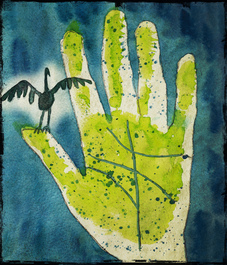 When I got home from the deaf-blind convention, I couldn’t stop touching people. It was a week of haptics, tactile sign language and fingerspelling, touching and being touched, and it just naturally continued flowing out of me. I found myself patting the hand of the policeman as he leaned into my car window to give me the speeding violation: Thank you, officer. And I couldn’t help stroking the arm of the bank representative when I stopped in to make a payment on my home equity loan: Principle only, please. And later, in line at the grocery store, I brushed a piece of lint off the sweater of the woman in front of me, pressing her shoulder reassuringly. When she turned around, startled by my touch, I touched her again, on the elbow, to apologize. Which only made it worse. People are touchy about being touched. They don’t like it. They misconstrue it. They take it as an advance: a pass or a flirtation, an aggression or an invasion. But not so with deaf-blind people. For deaf-blind people touch is everything. It’s communication and information. It’s intonation. It’s affirmation, feedback, backchanneling. It’s connection and community. It’s practically sacrament and yet it’s as natural and necessary as breathing. All week I had brushed up against and been brushed up against, gently bumping, gingerly jostling, signing and spelling into hands, printing on palms, scratching and tapping, sketching and mapping on backs, shoulders, knees, interpreting and chitchatting as my fingers and hands remained in almost constant contact with the fingers and hands and bodies of others. The deaf-blind world is a different world altogether. A world of physical contact. And already I found myself missing it terribly. In fact, I seemed to be going through a kind of withdrawal. I felt separated, isolated, untouchable in a world of untouchables. It felt like there was too much space between me and the world, too much space between people and things, too much space between people and people. I felt depressed. I began to self-medicate: I started touching myself. Not in a sexual way, but a platonic way, a deaf-blind way. My hands looked for each other; they touched each other and themselves, folding, tenting, twiddling, praying. And I touched my face - my temple, forehead, nose, cheeks, lips, philtrum, chin. My neck, head, crown, shoulders, arms, wrists, thighs, knees. I touched myself and I thought of my deaf-blind friends at the convention, whom I longed to see again, whom I longed to touch. But the next convention wasn’t for another two years. Especially I missed Adriana. Her slender, beautiful hands, the weightlessness of them as they rested on mine, listening. It wasn’t exactly romantic; it was more semantic: her nimble fingers, her fluent signing, the grammar of her face, her virtuosic receptive skills - it was all about language. I was seduced by the voluptuousness of tactile sign language. She was my deaf-blind delegate from NY, and I was her SSP (Support Service Provider). I guided her, assisted her, interpreted for her, clued her in and helped her out by touching her constantly, but only on her hands, occasionally on her back, or her arm, or the little atoll of her knee. “Those are the only permissible places,” the Pro-Tactile instructor told us during the short training session on haptics for interpreters and SSPs the first day of the convention. “To tell the deaf-blind person that someone is laughing, for example, you can spell HA-HA in her hands, of course, but if her hands are occupied, for whatever reason, then you can indicate it like this on her arm, or her back, or if you’re both seated, on her knee.” Then he did a little sort of double flex-scratch with all five fingers in the air, by way of illustration. “Nothing above the knee, though; and never on the head, or stomach, or chest, or butt, or breasts. Unless, of course, invited to, in the privacy of your dorm rooms.” There were some giggles. I have to say, those first few days at the convention, a part of me hoped I’d be invited to. And sometimes it seemed like I was on the verge of being invited to. But the invitation never came. And in a way, I’m glad it didn’t. Because it wasn’t about sex. It was so not about sex. And between you and me, some of us never grow wholly comfortable doing it, now do we? I mean doesn’t it feel a little like the blind signing their names on the signature line? I mean don’t we often need a hand to guide our hand to where they say the ultimate expression of who we are ought to be? And then when it’s done, it’s as though our lovers take back the pen, and the paper, eyeing the sad mark that is ours, and wondering what in the world the world should make of such a squirming, illegible thing.  Paul Hostovsky's latest book of poems is The Bad Guys (FutureCycle 2015). He is the author of seven books of poetry and six poetry chapbooks. His poems have won a Pushcart Prize and two Best of the Net awards. He has been featured on Poetry Daily, Verse Daily, and the Writer's Almanac. He makes his living in Boston as a sign language interpreter. To read more of his work, visit him at www.paulhostovsky.com. 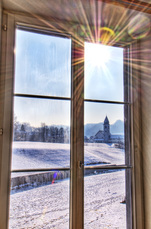 the traffic lights turn red, all the way down Park Avenue. snowflakes are falling and taxi's pile up. Black rubber boots step onto the thick wet snow, walk from the sidewalk to curb and a cab door swings open. Across the street is the Armory with its massive brick face of history taking up the entire block. The bus stop billboards flash slick photos of young men and women with their backs curved and bare. I step onto the slushy street and into her apartment building. Elaine lies in bed. She is sleeping and her mouth is shaped into a perfect O. A quiet hum rises from the small machine blowing cool mist in her direction. Standing in the doorway, I wait as I watch the silver mist travel serpentine then disappears, sucked into the warm dry air. she is resting lightly in her sheets and outside the day floats in a haze of whiteness. All day family and friends slip in and out. Heavy glass doors lead into a lobby of mirror and marble greeted by welcoming doormen who move swiftly--the elevator, gold buttons, the soft pink hallway, apartment 3G with the door ajar. Visitors walk in to the entryway, then more slowly into the bedroom. There is a hospital bed and chairs around it. On the side table sits a small paper cup with a long straw tipped and balanced. From her bedroom window you can see the Armory. She struggles to take a sip of the warm white liquid, “ I feel like a pancake,” she whispers to me. Her body is dead weight. Her feet are swollen and her skin is so thin with multiple shades of purple underneath. You cannot touch her with too much pressure or the skin will tear and her bruises will bleed through. I look out the window and notice that the snow has stopped and I think how lucky she is to have this view of the Armory. “Do you want the painting? Take the painting,” she tells me. Her finger points to the wall, to one of her older paintings. I see the rabbi’s back and he is standing in front of a thick stained glass window. He holds a prayer book. It is realistic and somber and not like her later abstracts that layer the canvas intricately with easy blotches of color. she searches the room while somewhere a train is rocking and eyes are opening from a sleep. It is late afternoon now and her bedroom has become more lively with visitors. They all marvel at the view and how smooth her face looks as it rests on the pillow. Her thin white hair is combed back like a straw halo. “Photos ? Tomorrow. No now.” We put a little lipstick on her, the color she remembered and it is the high point of her day. We all gather around her, smiling. The look in her eyes does not change, but her lips close, present and red.  Denise Mostacci Sklar has had a career as a dancer and now has had the good fortune to discover writing as another way to move through life. She also has the good fortune to study with poet/teacher Marc Olmsted. She has been published in numerous journals including the Aurorean, On the Rusk, Ibbetson Street Press, Wilderness House Literary Review, Gravel, Similar Peaks, Damfino, and Poesy. Denise is from Hamilton, Massachusetts where she lives with her husband and two incredible sons.  It was bare-foot perfection and sweet, salty, crunchy laughter. It was dusty road-side stands and juicy, strawberry days. It evoked perpetual summer. Then it became an island of exclusivity and long-sold hippy dreams. It was Martha's Vineyard. Things always happen in between. The first time we were there, I knew I would marry him. The second time we were there, the weather held a knife-edge of change. The Atlantic brought heavy fog and then whipped it away. We were there for another wedding. Guests spilled onto the street. Men hugged and patted each other on the back. They lit cigars. Women in heels tottered and kissed, kissed the air. So good to see you. How are the kids? How is the job? Lovely, just lovely. Pat, pat, kiss kiss. Voices cascaded, one after another like waves on the surrounding shore. David leaned against a rusty street sign, the red octagon—stop—a warning neither of us would heed. I will call him David, because the name means beloved. David, in history, was a king, a poet, a warrior. David, in this story, has a peace symbol tattooed on his shoulder. David was not the man I had married. He smiled at me, took my hand; I kissed his cheek. The voices went on around us, and we looked at each other through damp, cold fog. The crowd started to move from the street towards the beach. Side by side, we passed a low, white picket fence, along a bricked path flanked with blue hydrangeas. I did not look for my husband. I nodded at knots of people. I sneezed at the smell of perfume. I preferred the scent of bodies, the scent of sweat, the scent of the sea. The crowd moved slowly like a school of dead fish floating in the tide, bumping along in the ocean beyond. In the beginning, my husband and I had rented a shack near the beach. The shack had become real estate with an ocean view. We had become people at a wedding on Martha’s Vineyard. David sighed, his shoulder brushed against mine. His head dipped towards mine. Already I was aware of the proximity between our shoulders, between our mouths, between our hands. My feet sank into the beach. I bent down and removed my own heels. Cold sand seeped into my stockings. I shivered, my thin blue silk inadequate. David removed his jacket and placed it around me. Warmth built. Waves foamed. People turned towards the path. A young girl, golden ringlets blowing, scattered rose petals from a wicker basket. The bride followed her, barefoot, shivering, her dress billowed white behind her. She approached her groom. They stood side by side. They mouthed words I could not hear. I could hear the pounding of the surf on the shore, the pounding of my pulse. I could hear the sound of before. I could almost hear the sound of after. In between, there was a marriage.
 Cheryl's mother didn't call her. Instead she sent an email. Cheryl didn't know her mother emailed. Did she buy a computer? Probably went to the library. Cheryl closed her eyes and imagined the endless line at the library while her mother demanded the librarian's attention, taking up the allocated time of two or three people, just to get what she wanted. Her mother always got what she wanted. Cheryl could see it now. The subject of the email was This is from your mother. Looking back, it was worse than any virus, worse than any malware a Korean psychopath could have dreamed up. Your father, said the email, is back in my life. After fifty years! Do you believe it! The wedding's Saturday at noon. St. Christopher's. Hope you can make it. Love, Mom Cheryl was sixty years old. The last time she saw her father she was ten. They were in the kitchen of the only house Cheryl ever lived in. White shutters. Blue paint. A calendar with kittens on the wall. She remembered her mother crying, her father screaming, chairs being upended. A vase with limp flowers crashed to the floor. Cheryl hid in the corner with the cat. Then the front door slammed shut and he was gone. Every day when she came home from school she expected him back. She'd walk from the bus stop hoping and not hoping, fearing and not fearing her father's return. Past the O'Malley's house. Then the Lopez's. Looping the corner she'd swipe her hand over the big blue mailbox. Then she'd kick a pebble and watch the pebble bump along the sidewalk. Right. Left. Stop. Then again. Right. Left. Stop. Finally lifting her head and seeing the empty driveway, relieved and not relieved at the same time. For fifty years not a birthday card, not a Christmas present. Her father's name became a curse word. If the disposal was clogged, he was the grit in the drain. He was the misplaced key, the swallowed pit, the filthy puddle that ruined their shoes. The incubus. The bogeyman. He was bad luck in a suit. A year went by. They moved to the apartment on Kendall-who could afford a house-and lived paycheck to paycheck. Her mother went back to the community college and learned bookkeeping. Each night when she came home her lipstick was smeared, a button undone. The boss had me stay late, she told Cheryl. Each year a different boss. As soon as she could, Cheryl got her own apartment. She adopted a cat. She wallpapered the kitchen. She bought fresh flowers and placed them in a vase. But like the pattern on the walls, her life repeated itself. Cat. Flowers. Tears. Cat. Flowers. Tears. When her children were born, she told them that their fathers were dead. It was kinder that way. They could skip the sidewalks unencumbered, their chins high. Dear Mom, Glad to know you're happy. Then she pressed delete.  Born in Brooklyn, raised in Miami, and educated at the University of Michigan, Marlene Olin recently completed her first novel. Her short stories have been featured or are forthcoming in publications such as Emrys Journal, upstreet Magazine, Steam Ticket, Vine Leaves, Crack the Spine, Poetica, Edge, Meat for Tea, The Broken Plate and The Saturday Evening Post online. She is a contributing editor at Arcadia magazine. 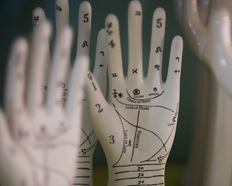 Sid slid through the crowd ‐ over the dirt path of the market ‐ with a girl he had by the arm. First, to find a sucker. The new mother with a loose grip on her clutch. The target wore a flower‐print dress and wicker sandals. She was begging for it. Practically, she wasn’t the beggar.She was the new mother. Old bag with a new clutch. He made off with it. Initials were printed in gold color on the faux leather, hers along with the initials of some romantic type; N.M. + R.T. Inside the clutch were two fives. Sid handed one to the girl. He took another and said, “we’ll split this one,” before he tore it in half. Now to the table where there sat some know‐it‐all type with ratty books for sale. Sid wanted the biggest one. Sid inquired. He talked the man down because the book was so ratty. “Those stories have been retold often,” the know‐it‐all said. Sid knocked over the whole stack, and offered to help the man collect them. He then stole the ratty old book ‐ Arabian Nights ‐ and left. “What’s that for?” the girl asked. “Fire starter.” “You like makeup?” Sid asked as they walked by the Mary Kay lady. He dropped vanishing cream into the clutch the the girl now carried. An officer, with three missing item descriptions and two suspects, attracted Sid’s attention. “Show time,” Sid said. He lit a match and held it to the book. It caught and was tossed in the trash. The law man became the fire man. The girl’s parents found their daughter, and asked about her accessories. The girl turned to Sid, who slipped away just in time. Sid sauntered toward home and casually flipped a classical Greek coin he had made disappear. From between two chicken shacks a jewelry maker called to Sid. “I can tell that you are a man of taste.” She wanted to know what he thought of her work. “Too easy,” he thought. His fingers grazed over the jewels. He dropped the largest stone into his sleeve. The jewelry maker grabbed his hand and turned it palm‐up. He laughed, there was nothing there, but she worked her bony finger in his hand and then said to him, “You’re playing the part, don’t you see.” “Excuse me?” “We are all predestined for something. I was compelled to read your place in our story.” “Are you supposed to be some fortune‐teller? You want a quarter?” “What are you supposed to be, young man?” “Sid.” “I know you by a less dynamic title. You rely on your hands. In the fingers you are dealt luck, in the palm, destiny. You are not free to choose what you take. You must take these things.Your part in the story is necessary.” “You sound like a hack to me! A story‐teller, not a fortune‐teller.” “This isn't for you to interpret. You are not a hero in this old story, thief." Chase White lives in Athens, Ga with his boyfriend of many years. He spends his time outside, writing and gardening. His best work happens to be under dirt smudges. Fortunately, some of it has been recovered, including a story forthcoming in Labello Press’ latest anthology. You can keep up with him on Twitter at @MotherNatsSon.
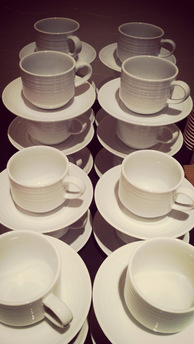 Fifty years ago, it was the smell of warm sweet dough fried up and made throughout the day that brought lines of people in to this small chain of New England coffee shops. While waiting in line you could glimpse the back room and watch dough being mixed in silver vats, then placed onto trays to be shaped, frosted and decorated. If lucky, your favorite variety will have just run out with a warm, steamy batch quickly on its way. Now the sugary deep fried carbs, all grease and glaze are packaged in a factory in a limited amount and shipped in each morning lasting only until they are sold out. But the pink and orange styrofoam cups of Dunkin’ Donuts coffee, watery and weak but oddly still good are worth a trip in once in a while. By mid day there are no long lines in this small town coffee shop, only scattered patrons running in and out and maybe a few people under florescent lights sitting quietly in a white, sterile emptiness. The workers keep the smell of anti bacterial cleanser wafting from the floor and tables by regular cleaning throughout the day in this 2014 FDA approved iconic chain and where there remains a kind of packaged nostalgia. The DD logo appears on billboards, TV, at sports events, its counters found under bright lights at train stations and airports, tucked away in the back of late night convenient stores. It has become a big business and has grown its presence across continents and oceans, staying current decade after decade, coffee and donuts, plus… the familiar colors flash. And still alive, the memory of crowded tables, counter and stools, Sunday mornings and families after church, a dozen donuts, the parking lot filled, teens, motorcycles and Hell’s Angels, a cup of coffee for 60 cents, a cardboard sign with a hand held out, the weekday rush of businessmen and woman, policemen and workers on break, busy and well lit late nights. And retired old men sitting at the counter with an endless cup of coffee poured into a real mug. No one noticed the cigarette butts dropped on the floor, half swept up but still scattered under their feet. Or all the cigarettes in hand with smoke trailing up, mixing with the smell of hot coffee and fresh donuts made ‘round the clock.’ My husband and I pull into the strip mall to get a cup of coffee. It is one of those late, blank afternoons that seem to come at the end of summer, no longer linear but laying on its back, as if time were trying to stand still for a moment. Around the back of the building next to the dumpster, there is a worker on break wearing a hooded sweatshirt. I watch him as he flicks his cigarette and enters the donut shop.  Denise Mostacci Sklar has had a career as a dancer and now has had the good fortune to discover writing as another way to move through life. She also has the good fortune to study with poet/teacher Marc Olmsted. She has been published in numerous journals including the Aurorean, On the Rusk, Ibbetson Street Press, Wilderness House Literary Review, Gravel, Similar Peaks, Damfino, and Poesy. Denise is from Hamilton, Massachusetts where she lives with her husband and two incredible sons. |
FLASH GLASS: A MONTHLY PUBLICATION OF FLASH FICTION, PROSE POETRY, & MICRO ESSAYSCategories
All
Cover Image: "Spots"
|
|
Glassworks is a publication of Rowan University's Master of Arts in Writing 260 Victoria Street • Glassboro, New Jersey 08028 [email protected] |
All Content on this Site (c) 2024 Glassworks
|

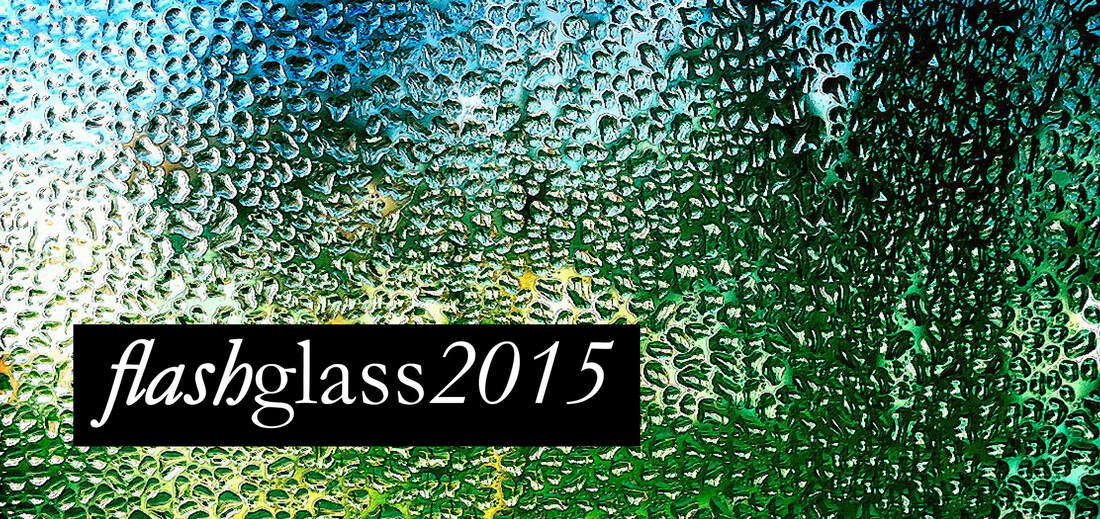


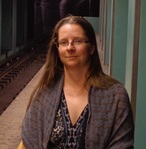

 RSS Feed
RSS Feed
